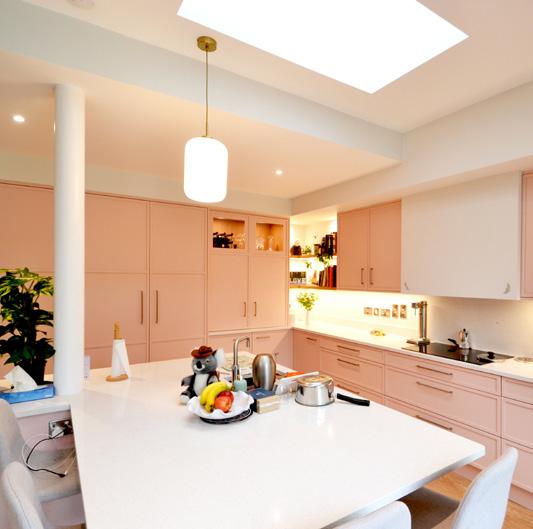Selfbuild



Whether you are upgrading an existing property or building new, the addition of an insulated thermal lining to the inside of a wall, roof slope or ceiling will dramatically improve the energy efficiency standards in your home.
Why choose Unilin Thermal Liners?
Optimum performance from a thinner board
Cost-effective
External wall appearance maintained
Easy to install
Readily available from your local builders merchant
For expert advice, contact our technical team on 046 906 6050 or discover the range below:


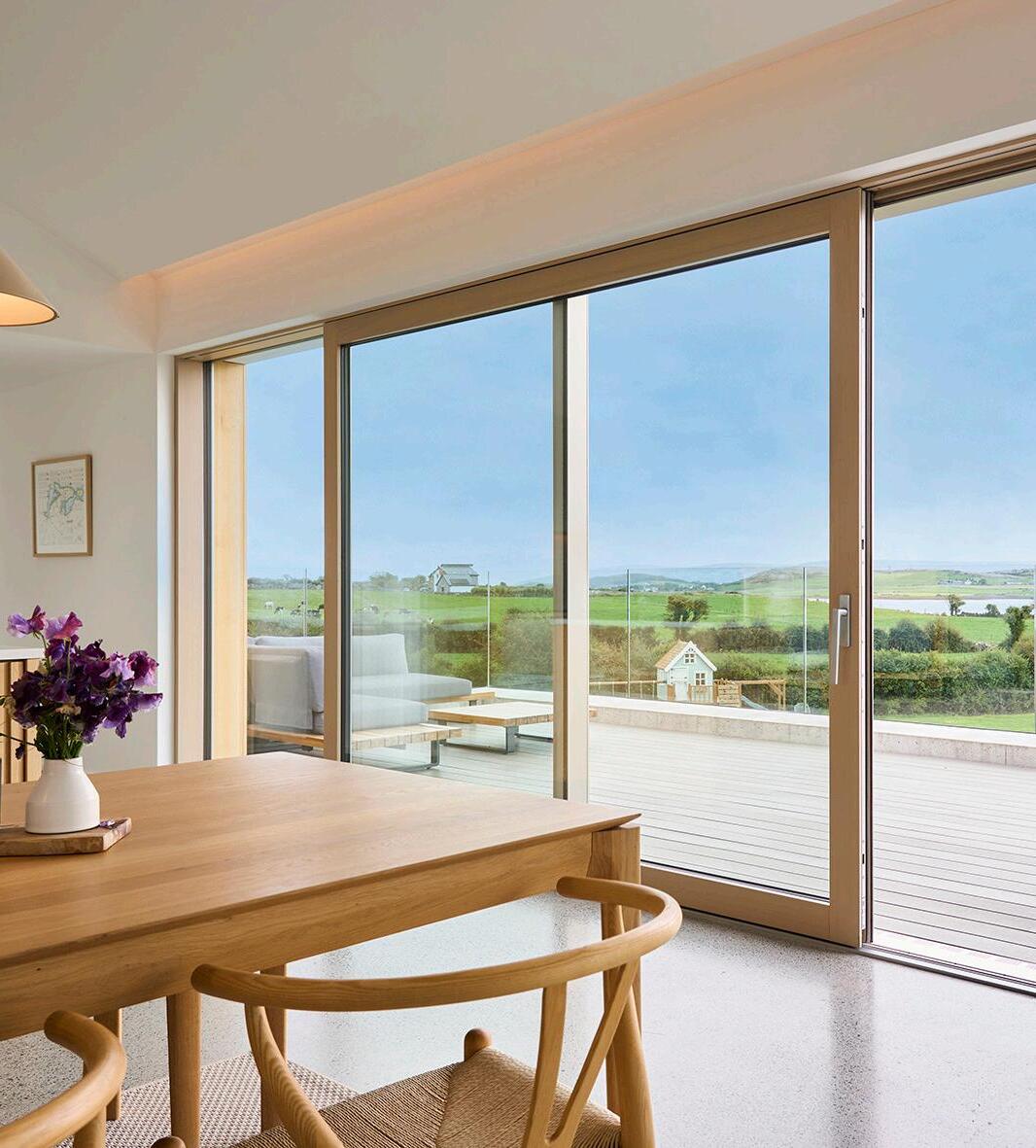
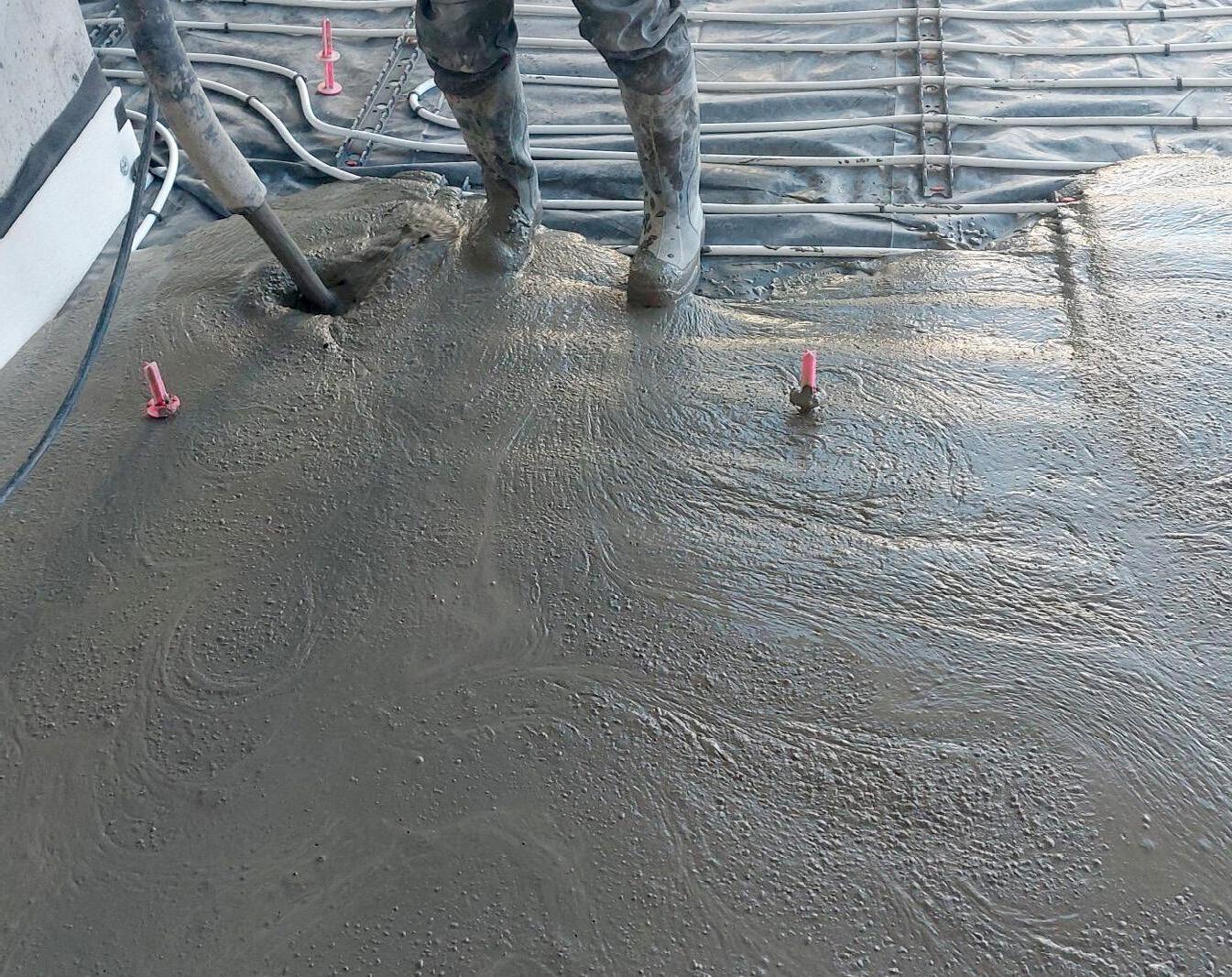
Roadstone FlowPlus is the next generation self-levelling cementitious screed developed in conjunction with the ARDEX Group.
Roadstone FlowPlus is the next generation self-levelling cementitious screed developed in conjunction with the ARDEX Group.
• Provides a quick, smooth and level surface with minimal leveling
• Ease and speed of installation
• Provides a quick, smooth and level surface with minimal leveling
• Suitable for all domestic and commercial applications
• Ease and speed of installation
• Suitable for all domestic and commercial applications

“There’s a lot you can do to save on the cost of building, and on your running costs.”

The double whammy of planning restrictions and high costs is putting people off building their own home. So now that we’ve gone past the metrics for Celtic Tiger madness, how long can inflation keep going? It’s hard to tell.
What you can do, is take your fate in your own hands. Yes, planning restrictions are, it seems, here to stay (see the latest on the topic from page 13).
The good news is, there’s a lot you can do to save on the cost of building, and on your running costs. From house shape (page 87) to balancing cost with quality (page 86).
We’ve loads of inspiration in these pages on how to build a cost-effective home, from a SIPs build (page 66) to the winners of the NI Federation of Master Builders Awards 2025, which showcase not only great-value builds but excellent craftsmanship (page 18).
Last but not least, if you’re in ROI, do sign the petition to save self-builders thousands of euros on their build (page 14).
We’ve been calling on the government to get the development waiver extended for self-builders only, and their answer, to put it bluntly (and in the words of the New York Daily News) was clear: Drop Dead. See page 14.
The same government had hinted it would revive the waiver if it were re-elected. And yet it’s turned its back on the very people who are willing to spend their own hard-earned money to build their own home. Which, by the way, would help alleviate the housing crisis at no direct cost to the taxpayer. Go figure.

Stay strong and happy building!

The Signing Off stage of your Journey deals with fixing any snags, getting the house certified and making sure you have all the paperwork you need to comfortably live in the home and eventually sell it.

Astrid Madsen - Editor astrid.madsen@selfbuild.ie
If you have a question, want to share some insights, or simply let us know how you’re getting on with your project, we’d love to hear from you for our Letters page. Email us at letters@selfbuild.ie

26 Curve appeal
Barbara and Patrick Cafferky’s new build in Co Wicklow is the bold and elegant statement home they wished for their retirement.
36 Flight to destiny
How Richard and Marie Williams built themselves a contemporary family home in Co Down on a very reasonable budget.
46 Comfort by design
Aideen and Dec’s Dublin home renovation project upgraded the house’s energy rating from a C2 to an A1 and created a comfortable, cosy home in the process.
56 Your home is your castle
All articles equally cover the 32 counties; when we refer to the Republic of Ireland the abbreviation is ROI. For Northern Ireland it’s NI.
Nicola and Sam Newell’s 200-year-old, Grade B1 listed, home restoration project in Co Down was a labour of love.

66 The five-month build
Padraic and Danielle Hickey chose SIPs as their building method to build their family home in Co Galway.
72 Compact city garden
This small garden project shows what can be done with a tight space in an urban location.
76 Letters
Connecting to broadband, planning issues and what’s the story with the development waiver?
78 Self-build pitfalls
How to avoid disputes and what the worst case scenarios look like.
80 Warm underfoot
The best finishes for underfloor heating.
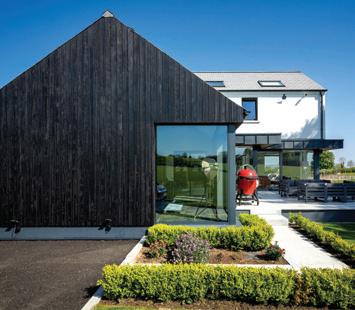
82 Inspiration: internal glass doors
From French to Crittal style doors, find out what your options are, how much they cost and how to make them work in your home.
84 The sweet spot
How much insulation is enough when building new and renovating?
86 Balancing cost and quality
Advice on how to tackle your new build project so it doesn’t cost the earth, from design to building fabric.
87 Shape matters
Optimal house shapes to save on both build costs and running costs.
90 Site safety
Why you should be concerned about it.

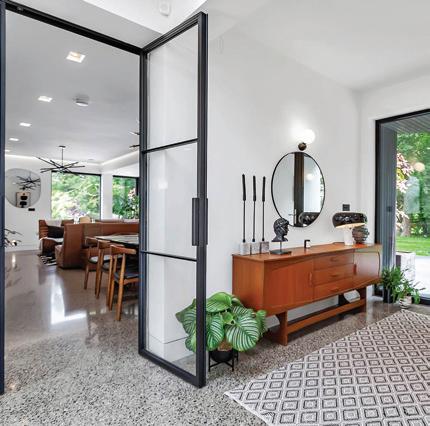

92 Overview
An introduction to the last part of your Selfbuild Journey: Signing off on the project, from certs of compliance to snag lists.
94 Snag lists
What they are, why you need them, and what they’ll include.
101 Retention
Holding back money until work is fixed, with tips to avoid disputes.
102 Dealing with conflict
A lesson in human nature, and how it applies to building sites.
104 Certification
What documents you need at the end to sign off on your build.

56
CONTACT
info@selfbuild.ie
EDITOR
Astrid Madsen astrid.madsen@selfbuild.ie
DEPUTY EDITOR
Heather Campbell heather.campbell@selfbuild.ie
DESIGN
Myles McCann myles.mccann@selfbuild.ie
Shannon Quinn shannon.quinn@selfbuild.ie
Megan Buckley megan.buckley@selfbuild.ie
MARKETING
Calum Lennon calum.lennon@selfbuild.ie
Victoria Hunter victoria.hunter@selfbuild.ie
Rebecca Ferris rebecca.ferris@selfbuild.ie
107 Selling the house
How conveyancing works and what you’ll need to seal the deal.
110 Making compromises
Louis Gunnigan of Co Dublin explains what snags he insisted got fixed, and what he agreed to let go, on his ICF build.
112 Snag as you go
Gavin Connolly of Co Antrim explains how to make a friend of your building control officer, and how to avoid leaving too many things to fix at the very end.
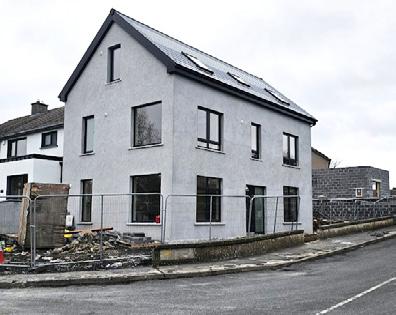
Erin Mason erin.mason@selfbuild.ie
SUBSCRIPTIONS
Becca Haslett becca.haslett@selfbuild.ie
ADVERTISING SALES
Emma Phillips emma.phillips@selfbuild.ie
Joanna McConvey joanna.mcconvey@selfbuild.ie
Lisa Killen lisa.killen@selfbuild.ie
Maria Toland maria.toland@selfbuild.ie
Nicola Delacour-Dunne nicola.delacour@selfbuild.ie
ACCOUNTS
Karen McLeigh karen.mcleigh@selfbuild.ie
Leanne Rodgers leanne.rodgers@selfbuild.ie
SALES DIRECTOR
Mark Duffin mark.duffin@selfbuild.ie
MANAGING DIRECTOR
Brian Corry brian.corry@selfbuild.ie
CHAIRMAN
Clive Corry clive.corry@selfbuild.ie
DISTRIBUTION EM
Delivering windows and doors that are crafted to last generations.
Redefining quality and luxury for almost a century. Our windows and doors are not just built to last, but crafted to inspire.
For more information visit nordan.ie
NorDan’s Timber/Alu-Clad Windows combine the classic warmth and beauty of timber on the inside with a tough weather-resistant aluminium cladding on the outside.
Merging timeless elegance and enduring strength, NorDan’s Timber/Alu-Clad Doors are perfect for those seeking stylish yet practical modern living solutions.
The ideal solution for modern homes and commercial properties, offering a huge range of design possibilities, enhanced energy efficiency, and premium performance.
The perfect solution for the contemporary needs of residential and commercial properties that highlight energy efficiency, low maintenance, and versatile design options.
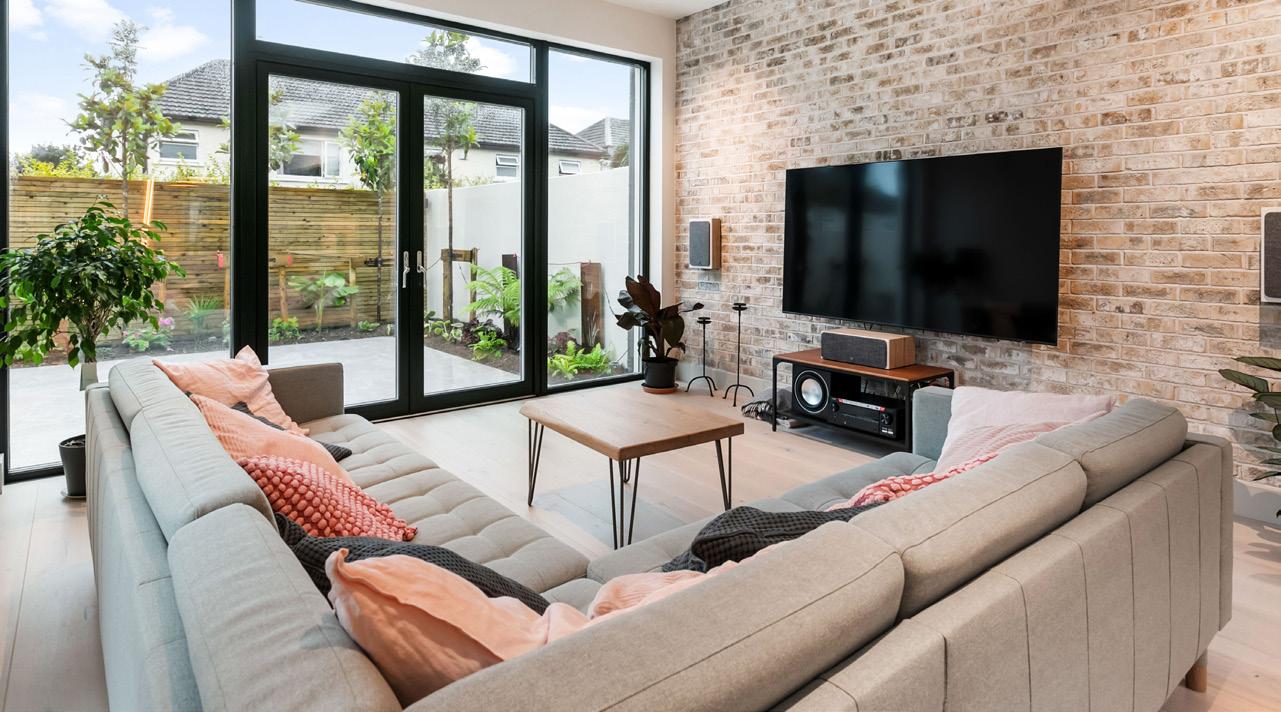
NorDan’s Entrance Doors have been designed with durability and energy efficiency at the core. With contemporary and traditional designs available, there is a perfect match available for your perfect welcome home.


Over half of septic tanks inspected by the ROI Environmental Protection Agency (EPA) failed in 2024, but the number of grant approvals to repair or replace an existing septic grant grew by over a third.
The failures, concentrated in areas close to rivers and private wells, pose risks to householders’ health and the environment. Of the tanks inspected, 56 per cent (773 systems) failed due to issues such as poor design, lack of maintenance or damage.
Domestic wastewater treatment systems collect, treat and discharge wastewater from households that are not connected to a mains sewerage system. Many self-builders who build their home in the countryside need an onsite wastewater treatment system as few mains connections tend to be available.

up from 75 per cent in 2021. The number of unresolved cases more than two years old is also dropping, from 576 in 2023 to 523 in 2024.
The EPA says this improvement is partly thanks to a higher uptake in grants.
The ROI government is considering extending the Extended Producer Responsibility (EPR) scheme to tackle construction waste, which represents half of all waste generated in ROI. Already in place for the likes of batteries, electronics, tyres and end-of-life vehicles, EPR schemes place financial and operational responsibility on producers for the entire lifecycle of their products, including their end-of-life management.
This means producers are responsible for financing and organising the collection, recycling, and environmentally sound disposal of their products when they are no longer in use.
The ROI government confirmed the First Home Scheme scheme will now run until June 2027.
Faulty systems can result in sewage leaks that threaten both the household’s own water supply and local ecosystems.
All septic tanks must be registered with local authorities who may inspect them to ensure they do not pollute waterways, soil and river streams.
The EPA report also states that the majority of issues flagged over the past decade have since been addressed: 82 per cent of tanks that failed between 2013 and 2024 had been fixed by the end of last year,
A key change introduced in January 2024 increased the maximum grant for remediation work from €5,000 to €12,000. The rule requiring systems to have been registered before 2013 was also scrapped, making the support more widely available.
The report also notes that four local authorities – Limerick, Donegal, Wexford and Leitrim – fell short of their inspection targets in 2024 and are expected to make up the shortfall this year.
The First Home Scheme is a shared equity initiative launched in July 2022 that was expanded in September 2023 to include self-builders. It allows eligible applicants to bridge the gap between their deposit, mortgage and the cost of building their new home.
To date, 135 self-build applications have been submitted.
The scheme has seen a surge in interest overall, with 858 new applications in Q1 2025 alone — up 49 per cent on the previous quarter — and 727 approvals (up 51 per cent). In total, over 15,300 people have registered interest since the scheme launched, and 6,700 buyers have been approved for funding.
A £100 water charge could largely solve NI’s water infrastructure crisis, according to a new report commissioned by the bodies representing the construction industry, housing associations and the NI Chamber of Commerce.
NI is the only part of the UK where households do not pay directly for their water. ROI does not charge households for water either.
Persistent underfunding of NI Water has led to a shortfall in wastewater infrastructure, which has contributed to limiting the number of houses that can be built.
According to the NI Chamber of Commerce and Industry, Construction Employers Federation and NI Federation of Housing Associations, more than 6,000 houses will not be built and thousands of jobs will be lost over the next two years unless urgent action is taken to avert a “full-blown crisis” in NI’s wastewater system.
Planning approvals for home extensions were up 10 per cent in 2024 in ROI, according to the Central Statistics Office (CSO).
The figures show a rise in planning approvals for home extensions and renovations in 2024, with Dublin leading the way.
Planning permissions granted for extensions and renovations went up by 7 per cent in 2024. Planning approvals for extensions rose 10.1 per cent to 7,741 in 2024, while renovations and conversions saw a smaller 2.2 per cent increase to 4,128.
Meanwhile, the number of one-off houses receiving planning approval dropped by 2.5 per cent to 4,906.
Self-builders in NI are facing delays and rising costs, but a shift in industry confidence hints at future growth.

The private house building scene in NI flatlined in the first quarter of 2025, and while that might seem like a sign of stagnation for self-builders there are some positive signs on the horizon.
The latest construction monitor report from the Royal Institution of Chartered Surveyors (RICS) reveals that private housing didn’t decline as much as other construction sectors, even though it didn’t see the growth many were hoping for.
However, surveyors are more optimistic than before, with 26 per cent expecting an increase in workloads over the next 12 months — up from just 10 per cent in the last survey. This suggests that, while progress is slow, things may pick up as the year goes on.
For self-builders, the news is mixed. On the one hand, the outlook isn’t as bleak as it could be, but on the other hand, there are still significant challenges to tackle.
Respondents to the study reports that labour shortages, especially in key roles like quantity surveyors, continue to impact project timelines and costs.
Self-builders might find themselves waiting longer or paying more than expected because of these shortages.
Also, common hurdles like planning delays, rising material costs and a shortage of wastewater infrastructure are still slowing things down. These issues can be especially tough for self-builders relying on a smooth process to stay on track
with projects.
For example, planning approvals in the last quarter of 2024 were 6 per cent down on the previous year according to a bulletin from the Northern Ireland Statistics and Research Agency.
Jim Sammon, RICS NI Construction Spokesman, said: “Whilst the NI construction market continued to face challenges through the first quarter of the year, it is encouraging to see that surveyors appear more optimistic on outlook, albeit that anecdotally they highlight a range of risks locally and globally.”
“Whilst it’s positive to see that surveyors report increases in public works and infrastructure workloads, issues such as planning delays, a lack of wastewater infrastructure and increased cost of materials are continuing to impact the sector.”
“But whilst these challenges are expected to continue through the rest of 2025, it is hoped that Northern Ireland’s construction industry will be on a path of positive momentum through the course of this year.”
According to forecasts from market analyst CIS, total construction starts will rise by 75 per cent from a value of £1.55 billion in 2024 to £2.7 billion in 2026 in NI as infrastructure and housing momentum builds.
Defective blocks homeowners say they are still out of pocket by €50-150k despite fresh government measures to improve the grant that’s available to rebuild.
Retrospective payments under the Defective Concrete Blocks Scheme were welcomed by homeowners affected by defective concrete blocks, however many are still out of pocket.
The ROI government’s grant scheme to help homeowners rebuild their home was introduced in phases; at first the grant was only available to renovate homes affected by defective blocks.
The latest applicants benefited from a higher rate of payment for the per square metre rate, which the government now says will apply retrospectively to eligible applicants.
Despite this welcome news, homeowners are finding that the current higher rates offered by the government are 18 months old.
“In our local microclimate of Defective Concrete Blocks counties, we know that this approximately 8 per cent increase barely touches the sides of what contractors are charging in a market where they can price jobs like they don’t want them and still get them,” homeowner Michael Doherty, who is in the process of rebuilding his defective block affected home, told Selfbuild.
“This particularly applies to homes over 200sqm where they suffer the double whammy of square metre rates that don’t match contractor rates then on top of that, a cap that means you effectively pay 100 per cent of every sqm after 200sqm meaning homeowners facing shortfalls between €50150k on average with most on the higher end of this range and beyond.”
Doherty says the Society of Chartered Surveyors Ireland (SCSI) has since provided new increased rates as per the annual review included in the Government Enhanced DCB scheme. “We are in arrears already by six months with not even a mention of these latest uplifts, but instead, choosing to publish the out of date rates that should have been in place 18 months ago,” he added.
“This behaviour is not new to us as we continue to fight for a true 100 per cent
redress for all affected families with no one left behind.”
In October 2024, the government increased the amount a homeowner can receive under the scheme by 10 per cent from €420,000 to €462,000. Similarly, the per square metre rates that are used in the scheme to calculate the grant amount were also increased in November 2024 by between 7.4 per cent and 8.7 per cent.
Currently these increases only apply to eligible homeowners yet to receive a determination in respect of remediation option and grant amount.
In other words, some homeowners who have been impacted by higher construction costs cannot receive this increase. Under the changes, proposed by Minister for Housing, Heritage and Local Government, James Browne, eligible homeowners will now be entitled to apply for the higher amounts.
The Minister issued a press release to state that legislation will be prioritised to ensure homeowners that have incurred eligible scheme costs since March 29, 2024 can benefit from the increased grant amounts announced late last year.
Along with details around retrospective payments, the Bill will include several amendments to assist in the improved running of the scheme including: Side-by-side construction: The proposed changes will provide for the scheme to fund the construction of a new dwelling adjacent to the original defective home in very
The Defective Concrete Blocks Grant Scheme is a financial support for affected homeowners to remediate homes damaged by the use of defective concrete blocks in their construction in counties Clare, Donegal, Limerick, Mayo and Sligo.
More counties are believed to have homes built with defective blocks but the scheme is not open to them. In 2022, defective blocks had already been found in 13 counties across Ireland.
So far, the government says there have been over 2,500 applications to the scheme, which are processed through the local authorities.
In 2017, 5,000 homes affected by defective concrete blocks had already been identified.
Last year the total rose to 7,000 homes.
limited circumstances for specific homeowner families.
Period to complete works is extended: The changes will increase the time allowed to complete remediation works from 65 weeks to 130 weeks and the advance notice period for the extension to this period goes from 12 weeks to 2 weeks.

More planning permission exemptions are coming in ROI, with public consultation due this summer, including for building a new house in the back garden.
Self-builders in ROI could soon benefit from more planning exemptions, as the government prepares to launch a public consultation on a wide ranging review of the rules this summer.
The proposed updates could have a significant impact on anyone planning to adapt or extend their home, including self-builders hoping to add space or create multigenerational living options more easily.
The government had already signalled in February that houses in the back garden would become planning exempt. The public consultation this summer is the next step in making ‘modular buildings used as habitable space within the garden of a main home’ planning exempt.
The other measures under review are planning permission exemptions for attic conversions, including
the installation of rooflights, the subdivision of existing dwellings, conversions or extensions to create housing for older people, and more flexibility in extension design (especially around roof shapes).
Minister of State for Older People Kieran O’Donnell linked the review to the Government’s aim of supporting positive ageing: “With the right types of planning exemptions, we can
simplify and make it easier to convert houses into separate living spaces, allowing older adults to continue living in familiar surroundings while adapting to changing needs.”
The Department has not yet published the full draft regulations, but the upcoming public consultation offers an important opportunity for self-builders to make their voices heard on the types of exemptions that would make projects more feasible and affordable.
A rural self-build home in Co Mayo has been refused planning permission by An Bord Pleanála on the grounds that it would create an “obtrusive feature on the landscape”.
The decision overturns an earlier approval by Mayo County Council and highlights the critical role that site selection and visual impact continue to play in planning outcomes, especially in upland or exposed areas.
The case involved Leah Kelly from Westport who applied to build a singlestorey house on family land at Devleash West, Ayle, approximately 1.5km southwest of Killawalla.
In her planning application, Ms Kelly explained that she currently
lives and works in Co Clare but hopes to return to Mayo to raise a family. The land in question had belonged to her late grandmother, and her uncle, Padraic Kelly, confirmed that his mother had intended for Ms Kelly to be given a site so she could build a home when ready to settle in the area.
The application also stated that Ms Kelly lived in the family home from 1991 to 1996, and again from 2010 to 2014.
However, this was contested by Martin Costello of Devleash, Killawalla, who claimed Ms Kelly never lived at her grandmother’s address. He objected to the proposed development on multiple grounds.
Mayo County Council planners concluded that
Ms Kelly had demonstrated strong family ties to the locality and deemed the construction of a singlestorey home acceptable.
Mr Costello appealed the decision to An Bord Pleanála and also claimed that the dwelling height and scale will “interfere with views of the open countryside” and the house design is not appropriate to the rural location.
In his report to the board of An Bord Pleanála, Stephen Rhys Thomas, a senior planning inspector described the site as “elevated and exposed” and noted that “significant works will be required to construct the proposed dwelling”.
He added that the “visual impact of the dwelling and associated development will
be a noticeable feature on a landscape not characterised by one off rural dwellings”.
“The proposed dwelling itself may be in accordance with the design principles of the rural housing guidelines, however its location and position within the wider landscape fails to meet the site selection and house siting advice as set out in the guidelines,” he wrote while adding that permission should be refused on the basis that the landscape character of the area will be adversely impacted upon.
In its ruling, the Board of An Bord Pleanála agreed with the planning inspector’s conclusion and overturned Mayo County Council’s decision to grant planning permission.
A Nenagh councillor tells Selfbuild that red tape, land rules and poor infrastructure are driving people away from building their own home.
The current planning system is locking out aspiring rural homeowners and forcing the next generation to leave Ireland, according to councillor Séamus Morris of Nenagh Municipal District, who has called for an urgent overhaul of national policy to support self-builders.
Speaking in the wake of a recent council debate on housing and infrastructure shortfalls, Cllr Morris said people trying to build homes in rural areas are being “tormented” by restrictive planning laws and spiralling costs – a combination he fears is pushing skilled young people out of the country.
“God help anyone trying to build anywhere at any time now,” he told Selfbuild. “It’s such a challenge –planning permission, Irish Water and ESB connections, and the absolute cost of it. That’s before you even get to the issue of capacity in wastewater treatment plants.”
Cllr Morris was critical of the National Development Plan’s aim to deliver at least 40 per cent of housing within existing built up areas such as towns and villages.
“That’s not possible when the wastewater treatment plants and water capacity are an issue,” he said. “In the Nenagh Municipal District, we have wastewater treatment plants that lack capacity. There’s no point asking people to build in these areas while refusing them permission to build on their own land.”
He believes the solution lies in supporting people who already have access to land and want to stay local.
“I am looking for a suspension of the National Development Plan so that people who can come up with a site should be able to build. In fact, we should be putting our arms around them, rolling out the carpet, and thanking them,” he said.
“Because most of these people will stay in the country and they will have the ability to grow villages in rural Ireland.”
The alternative, he warned, is emigration. “Basically, we have two choices: either allow these people to build or lose them for good. Otherwise, they’re living in their parents’ back kitchens and their childhood bedrooms. We’re losing highly trained professional people because of their inability to self-build.”

The Tipperary councillor also called for an end to what he sees as out-of-touch planning criteria that exclude many rural applicants. “We have to get rid of this ‘local need’ crap,” he said. “You can’t get planning permission in rural Ireland unless you’re almost a full-time farmer. That has to go.”
He also criticised restrictions on ribbon development – which limit the number of houses allowed along rural roads – and wants such rules suspended during the housing crisis. “All of those things need to be withdrawn. We are in a housing crisis.”
Cllr Morris said many people don’t even apply for planning because they know they won’t qualify.
“I know several people who told me during my canvass that they didn’t even bother trying because their son or daughter isn’t in full-time farming,” he said. “These people aren’t even statistics – the only statistic they become is when they leave the country.”
Reflecting on the recent county and local area development plans, Cllr Morris said his calls to protect zoned and serviced land were ignored – only for the government to backpedal later.
“I asked the council not to dezone land during a housing crisis – they didn’t listen. Now the housing minister, James Browne, is talking about enforcing Section 28 to rezone land that was just dezoned. Are they trying to torment people or what?”
He believes the government’s missteps are fuelling public frustration and boosting extremist narratives. “What’s happening is we’re driving people into the arms of right-wing lunatics,” he said. “We’re bringing people into the country under EU emergency legislation – and I embrace every person in our country –but at the same time, we’re not relaxing planning laws to let our own build.”
With house building now out of reach for many without government support, Cllr Morris expects development levies and water charges are here to stay – but insists planning reform must come first.
“We need a huge dose of cop-on,” he said. “You can’t promise tens of thousands of new houses without checking what capacity exists in our water and wastewater plants in each town and village. That’s where the money should be going.”
One-off housing crippled by building costs, according to Co Mayo councillor.
With the Economic and Social Research Institute (ESRI) downgrading housebuilding and growth forecasts for ROI and house price inflation hitting a 10-year-high, according to daft.ie’s latest report, there’s been an increasing concern around affordability for everything from groceries to building a house.
Councillors are now making the case that young people can no longer afford to build houses in the countryside.
Erris Gerry Coyle told a Mayo County Council monthly meeting that a young couple in his area spent €15,960 before laying a block,
as reported in the Connaught Telegraph.
The breakdown of that cost was €5,390 for the engineer, €3,520 contribution fee to the council, €1,200 following the council’s request for more information, €1,200 water connection, €500 for an Article 6 Map for the council, €600 for the trial hole inspection (percolation test for on-site wastewater), and €3,500 electricity connection.
Auctioneer Brendan Mannix told Radio Kerry that on two sites, the couples had gotten planning permission but had to decide against building their own home due to the cost of building.
Compounding the build cost issue are getting planning permission in the first place, as many areas are not zoned for building, even though they are serviced sites, and others abide to decades-old ‘locals only’ rules.
Coyle said a site he wanted to include in the County Development Plan was rejected by the planning department, even though it is serviced with a sewer and water.
Councillor Michael Kilcoyne asked why a home on a public water and sewerage scheme, with
properties either side of it, would be refused planning. It was 500 metres outside an imaginary boundary but if the applicant moved in with a neighbour on the countryside, he’d get planning.
Councillor Annie May Reape highlighted a case of a man born in the Ballina area who returned from the USA to retire here but was told he couldn’t get planning as he doesn’t live here. “We have to make it easier for people to build,” she said.
Councillor Mulroy said people would move to desirable rural areas if they could get planning.
Removing supports for self-builders and refusing to reinstate them has led to a drastic drop in commencement notices in ROI, new figures show.
Commencement notices for ROI one-off houses dropped sharply in 2025, as the ROI government tells Selfbuild it has no plans of reinstating supports.
The figures are the lowest in 10 years, showing more than a halving in commencement notices since the start of the year.
There were 60 per cent less commencement notices filed for one-off houses from January to May 2025 (1,286) as compared to the same period the previous year (3,212). On average the figures to date for 2025 represent a 30 to 40 per cent drop over the past decade.
In 2024, the waiver to pay
local authority development contributions (Section 48) and Irish Water connection fees, (€6k between water and wastewater connection charges), led to a sharp rise in the number of commencements.
The waiver saved selfbuilders thousands of euros on development contributions alone.
However, despite a petition to extend the waiver indefinitely for selfbuilders, which has over 2,600 signatures, and ample evidence for the need to provide supports to selfbuilders, the Department of Housing told Selfbuild: “At this time, it is not proposed to
extend the terms or timeline of the scheme beyond those as approved by the Government in its Decision of April 23, 2024.”
Then Minister for Housing Darragh O’Brien had indicated in 2024 that if the coalition government were to be re-elected, there would be scope to consider reinstating the waivers.
However, in its letter the Department told Selfbuild: “The temporary measures were always intended to be time-bound and this waiver has had the desired effect to deliver more housing.”
This comes at a time when Minister Browne indicated that the government’s own
target of delivering 41,000 homes wasn’t realistic.
The Central Bank’s quarterly economic report had to revise housing completions downwards, 32,500, 37,500 and 41,500 in 2025, 2026 and 2027, respectively.
The main support available to self-builders now is the Help to Buy scheme which is open to anyone buying a new house or building one.
At the time of going to print the petition had 2,678 signatures; make your voice count

Independent TDs mount pressure on ROI government to support one-off housing in the countryside.
call to reform rural housing guidelines to allow multiple family members to build on farmland, ease planning restrictions on modular homes and granny flat conversions, and limit objections to local residents, were raised in the Dáil in a private members’ motion on June 25, 2025.

AThe Legislative and Structural Reforms to Accelerate Housing Delivery motion also emphasised the importance of standardised, high quality, energy efficient housing and reducing VAT on construction materials.
Rural housing guidelines should be reformed to allow multiple homes on family farmland, argued the independent TDs.
“On rural housing guidelines, we see problems where family members are trying to build,” TD Michael Fitzmaurice told the Dáil, who argued more than one family member should be allowed to build “as long as sightlines and percolation tests are okay”, adding “because, at the end of the day, we have an emergency and if we have an emergency, we have to try to sort it out”.
“Week in, week out, daughters and sons of farmers come to see me about trying to get planning on their own land,” said TD Michael Collins. “The hoops they have to go through are unbelievable. God help us if there is more than one daughter or son in a family.”
“The Government must think people should have only one child, like a Chinese family. We are proposing that standardised housing designs be permitted to speed up planning while complying with regulations.”
The motion argues that if a teacher
were to move to an area in rural Ireland, they should be given planning permission to build too. The problem now, Fitzmaurice says, “is they are not from that area originally, and some councils will not give them planning permission”.
TD Paul Nicholas Gogarty added: “We had the bungalow blight of the 1970s with poorly designed houses. While I agree with Deputies Collins and Fitzmaurice about having a standard type of house, it has to be a high quality standard that is energy efficient and can produce its own solar electricity to power electric vehicles, EVs. Let people live and work in rural communities. That would be a win-win for everyone.”
Minister of State at the Department of Housing, Local Government and Heritage John Cummins said the department’s rural housing guidelines, are under review by the Department of Housing (they have been for decades), adding: “There is a need to ensure they are carefully calibrated to support the development of rural one-off housing while also ensuring appropriate safeguards are in place. These changes will improve transparency, timeliness and accessibility in our planning process.”
As the ROI government prepares to make changes to the planning system (see page 12), TD Michael Fitzmaurice said that modular homes and granny flats should be planning exempt up to 600sqft/63sqm. “These should be exempt, provided they are built at the back of an existing house,” he said.
“If the garage is at the back of the house and can be converted, it should be exempt. This is how we will get things rolling, helping people to put a roof over their heads.”
He added that planning objections should only be allowed for people in the locality: “Someone from 120 miles to 130 miles away should not be in a position to object.”
Minister of State John Cummins said the department is undertaking a review of these provisions, and that a public consultation is expected to commence in July.
To further support construction, construction bodies in both NI and ROI are advocating a reduction in VAT.
Independent TDs support a temporary reduction of VAT on housing construction materials to 5 per cent. They are currently charged 23 per cent when bought off the shelf or by the self-builder; when bought through a trade or builder, the rate is 13.5 per cent.
The Construction Industry Federation (CIF) also advocates for a reduction in VAT, between 0 to 5 per cent on housing products, arguing this would improve affordability and housing supply.
In a report focused on energy efficiency upgrades, the Federation of Master Builders (FMB) recommended lowering the VAT rate on renovations to 5 per cent to reduce costs and encourage homeowners to invest in upgrades.
Prefabricated timber frame house manufacturer WeberHaus has recently resumed its activities in the Irish self-build market. With the experience of over 40,000 built houses and properties, WeberHaus offers sustainable, innovative and bespoke homes to those wishing to build their own house.
UK-based long term design partner Urbancurve Architecture with Nick Blunt and his team, are working hand in hand with WeberHaus to turn design ideas into bespoke luxury homes.
WeberHaus offers a ‘one-stop-shop’ from

Lifesize Floor Plans has rebranded to Walk Your Plans, a name that better reflects the company’s mission to revolutionise the way people experience their future homes and spaces.
The rebrand marks a bold step forward as the business pioneers the first-ever free walk virtual reality (VR) studio in the UK and Ireland. This ground-breaking new studio will give self-builders, architects, and developers the opportunity to physically walk through their 2D plans in full scale, not only with the projection studio but also now in VR.
“This is about pushing boundaries, we started as a floor plan projection service, helping clients get a true sense of scale and layout. But we’ve always wanted to go beyond that and to give people a truly immersive, interactive way to experience their designs before a single brick is laid,” explains Chris McBride of Walk Your Plans.
walkyourplans.co.uk
design to construction and interior finish, making the process as easy and enjoyable as possible. You know the specification and scope of work in advance, you get a fixed price and a project timetable you can rely on.
It’s also possible to bring your own design and have it translated into a WeberHaus.
Manufactured at the WeberHaus factory in Germany before being shipped to Ireland, you have complete visibility and transparency over the specified materials and are assured that you get what you pay for.
weberhaus.ie / weberhaus.co.uk



Bath Shack has opened its doors in Lurgan, Co Armagh, marking the milestone of having 12 showrooms across NI and ROI. The other showrooms are in Cork, Dublin, Belfast, Ballymena, Lisburn, Boucher Rd Belfast, Coleraine, Antrim, Armagh and Galway.
bathshack.com


Wood Innovations just opened its new 33,000sqft headquarters and two new showrooms in Newry, marking a milestone in the Irish company’s 29-year journey.
It’s not just a 33,000sqft warehouse that was opened, but two stunning new showrooms.
Wood Innovations Ltd supplies engineered and solid wood flooding, vinyl and laminate flooring, Pergo as well as wall cladding solutions and floor accessories. The company holds the accolade of Silver Investors in People Accreditation. woodinnovations.com



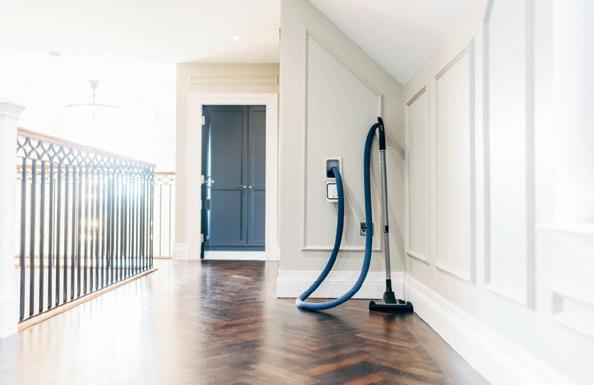
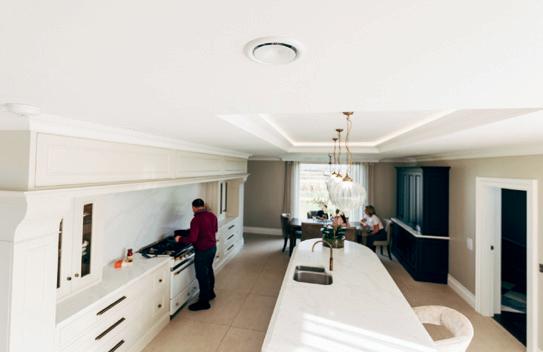




A range of projects were rewarded at the Federation of Master Builders (FMB) NI awards ceremony.

G M Construction won the ultimate prize, the Housebuilder Award, for a contemporary countryside home that masterfully balances bold design with rural tradition.
The home takes inspiration from the classic courtyard farmyard layout: a series of
Bathroom Project winner: Schofield
Construction
This bathroom is part of the wider renovation of a 100-yearold farmhouse with uneven walls and dated infrastructure.

pitched roof forms grouped around a sheltered, southwest-facing courtyard. The variation in ridge heights and use of white render, dark grey cladding and slate roofing echo the region’s rural vernacular while giving the build a sleek, modern edge.
Designed with intent, the
home separates living and sleeping zones across single and 1.5-storey elements.
A vaulted kitchen ceiling with visible ribbed rafters adds height and character, reinforcing the barn-style aesthetic.
Other highlights from the awards include:

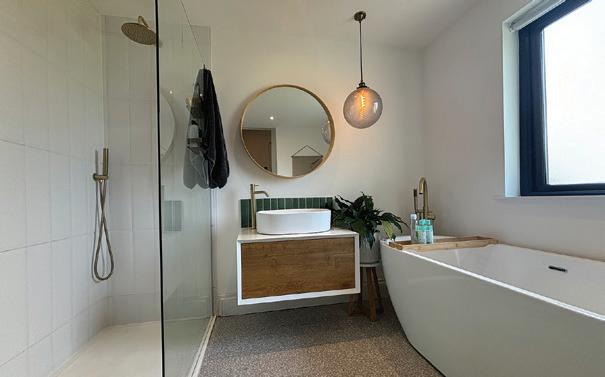


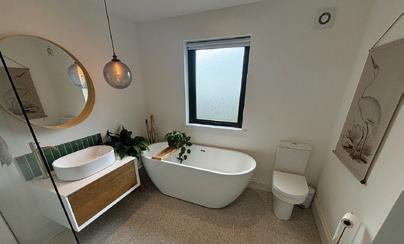

Key highlights of this project include the custom-made birch plywood cabinets, sleek quartz worktops with a breakfast bar, and underfloor heating. Schofield Construction overcame challenges pertaining to the sewers located directly underneath the kitchen, upgrading insulation in the vaulted ceiling, and creating custom window surrounds.
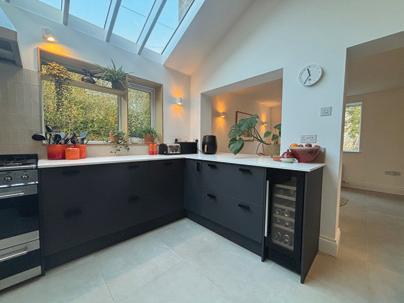

The project involved the extension and renovation of a 1960s bungalow with a retro aesthetic; the challenges included removing walls, installing a large corner lintel, and constructing the deck on a 45-degree slope with backfilled ground, which was achieved using ground screws.
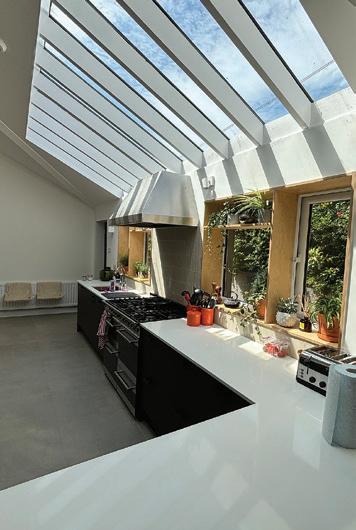

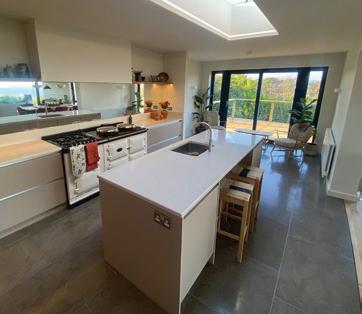

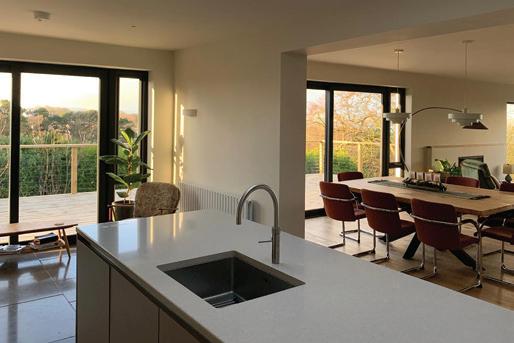
The Architectural Association Ireland (AAI) Awards 2025 have rewarded an architect’s self-build, a tiny house and a timber frame extension.
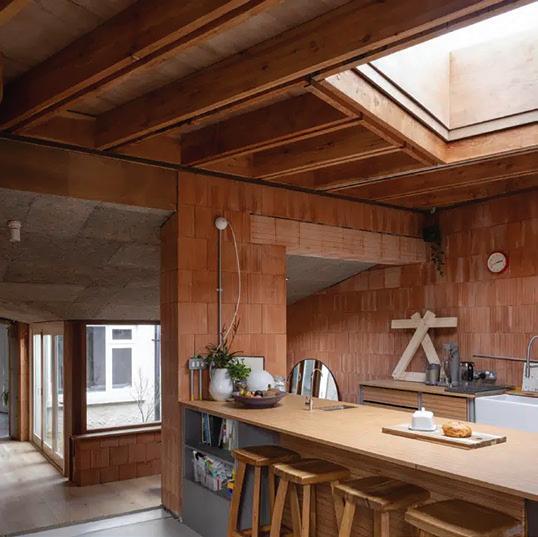
A Special Mention Award was granted to an innovative ‘outward and upward’ extension of an existing timber frame garden by Cineál: Research + Design. This ‘Tiny House by the Sea’ sits next to The Murrough, a 15km-long protected coastal area.
The idea behind the project was to create an “economically, socially and environmentally sustainable solution” for a new dwelling within a shared garden.
The garage was extended both outward and upward to create a self-contained living and sleeping space.
The rectilinear form of the extension frames views of the surrounding landscape, while a full-height window to the west provides the perfect spot to watch the sunset each evening. A strategically placed rooflight captures the sounds of birdsong from the nearby tree canopies.
An architect’s self-built home has earned top honours at the 2025 Architectural Association of Ireland (AAI) Awards, standing out as a benchmark for contemporary Irish residential design.
Ben Mullen Architects’ ‘A Vernacular Future’ entry was one of the six main award winners as voted for by the AAI.


Special Mention Award
winner ‘Sundial,’ is a clever reworking of a late 19th Century terraced house in Dublin’s Liberties by Donaghy + Dimond Architects, which transformed the building into a lifetime-accessible, A-rated home.
By using natural materials to preserve and upgrade the original structure, the project cuts embodied carbon and achieves near-zero energy (NZEB) performance.
This single-storey terraced
house has been reconfigured to create bright, spacious and accessible living and working spaces, all arranged around a sun-filled south-facing courtyard.
The design preserves the existing external and party walls, along with earlier additions, while transforming the layout by rebuilding the envelope facing the courtyard. This new facade features glazed brick and opening timber screens, with a Douglas fir roof structure spanning the newly configured rooms.
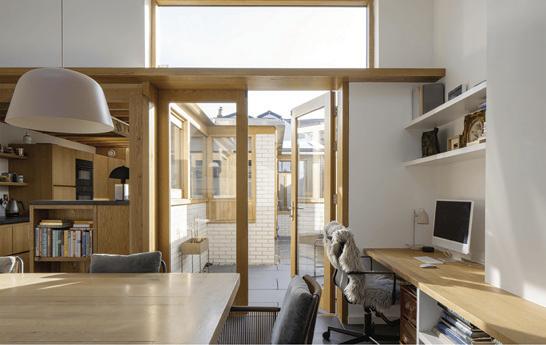
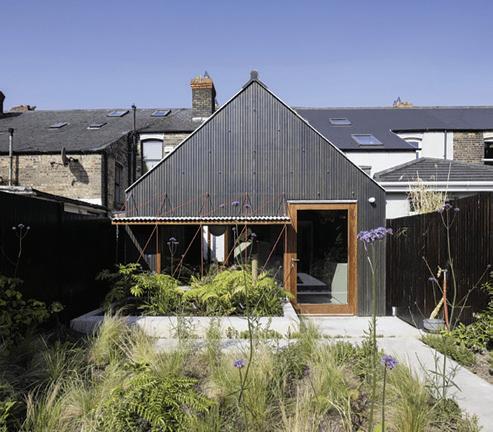


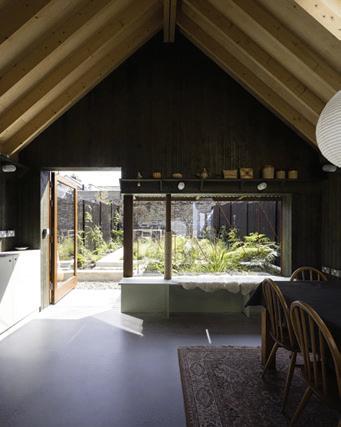
Another thoughtful project that received a Special Mention Award was a small one-room house extension in Reuben Street, Rialto, Dublin designed by TAKA Architects.
Created for two visual artists, the design grew out of early conversations about timber construction and the calm, considered feel of traditional Japanese rooms and gardens.
Co Limerick upside down 1970s ‘Brady Bunch’ family home bags coveted RTÉ Home of the Year 2025 award.
Amy and Eoin Martin won RTÉ’s Home of the Year 2025 for their bold and beautifully renovated 1970s Limerick home.
Falling in love with the character of the upside down house —where the main living spaces are on the first floor to make the most of the garden views and natural light — Amy and Eoin took on a complete transformation of the property.
As well as decorating each room to suit their tastes, the couple brought up the energy rating from a D3 to an A3.
“It still had a lot of its original features,” Eoin says, thinking back to when they first bought their forever home following years of renting and a 14-year stint living abroad in Australia.
With two teenagers, three cats and a dog, the two admit that the house doesn’t always look quite so camera-ready but that clever storage hacks and DIY decor have been their saving grace in day-to-day life.


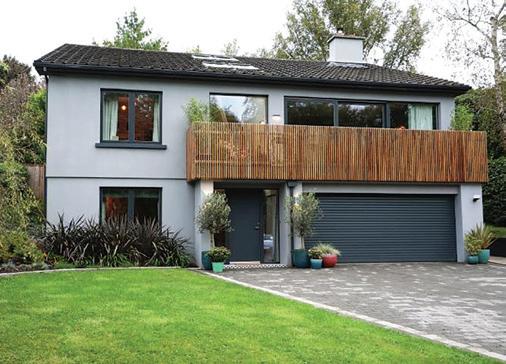



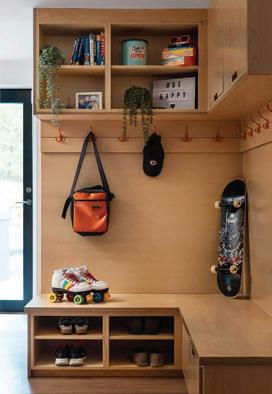

The other six Home of the Year 2025 finalists were:
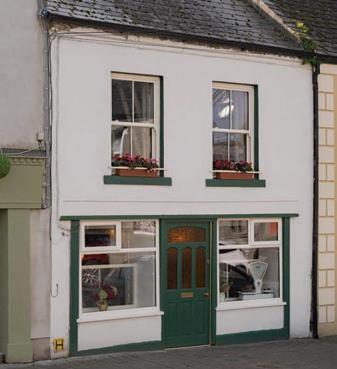
Claire and Seán live in a former shop originally built in the 1860s; they kept as much as possible from the old building, repurposing dressers, wardrobes and the original spindles from the shop. Claire worked with her dad, a retired engineer, to adapt a lot of the furniture, including making a backsplash from the copper water cylinder and turning a bunkbed into kitchen cabinets.
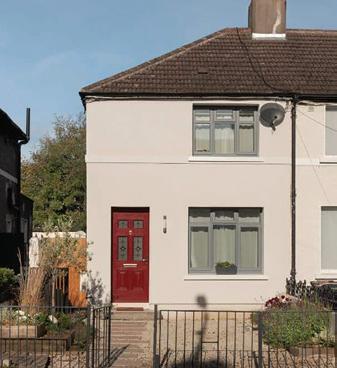
The couple bought their 1930s home in 2020 and began refurbishments. They were a great team as Roisin, an architect, designed the renovations while Matteo is handy at DIY. They worked hard to redesign the layout and maximise space and got interior influence from their mid-century furniture and the Scandinavian design style with their focus being on clean lines and the use of natural materials and textures to add warmth.

Lynne and Nick’s home, built in 1862, was formerly a nursing home which had been left vacant for nearly a decade. In the 2020s an extensive renovation took place where they demolished the entire rear, built an extension, and replaced all windows with appropriate period style sash windows while retaining any original features they could. The family also worked hard to bring the entire house up to a BER A3 rating.

The couple bought this period house in 2005 and took on major renovations, doing most of the work themselves over a four-year period. Mary says she brings the creative ideas which Aiden turns into reality.
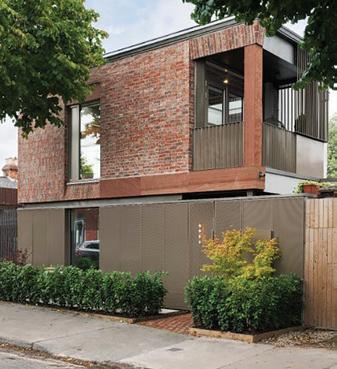
Passionate about wanting to build her own A-Rated home, Jenny Anne built a two-bedroom infill on a tight site that still manages to feel spacious and comfortable. The design makes use of a site previously containing a derelict garage structure to the rear of an existing property, subdividing a single plot into two dwellings.
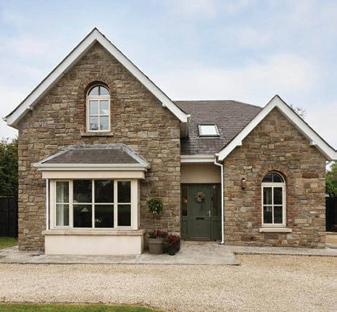
During the height of the Covid pandemic, the couple moved into an empty shell of a house – no kitchen, no flooring, not even a functional bathroom. After eight long months their redesign began, with the two having worked hard on design plans and the layout, completely changing the internal function of the house.






Say goodbye to bulky solar panels. The PV InDaX Adapt system is designed to integrate seamlessly into your roof, sitting flush with your tiles for a clean, modern finish. No compromises – just maximum energy yield and stunning aesthetics.
Low-profile, black aluminium framing
High performance crystalline technology
Fast, safe installation
Weathertight & wind-resistant
MCS & BBA certified 25-year power output guarantee Make your roof work harder – without ruining the view. Discover PV InDaX Adapt today.
Belfast: +44 28 9038 0060
Omagh: +44 28 8224 6220
Dublin: +353 1 623 4541
Limerick: +353 61 531 381
Cork: +353 21 432 1868
www.sig.ie enquiries@sig.ie



